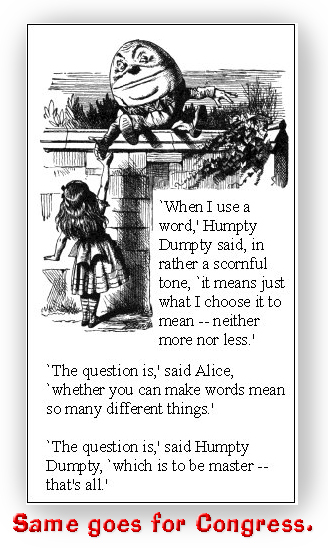We post news and comment on federal criminal justice issues, focused primarily on trial and post-conviction matters, legislative initiatives, and sentencing issues.

TWO EARLY HABEAS DECISIONS ON FSA CREDITS AND DETAINERS ARE POSITIVE
 The Federal Bureau of Prisons has been refusing to award earned-time credits (ETCs) for prisoners who complete evidence-based programs to reduce recidivism (EBRRs) where the inmates have detainers, whether for immigration, pending charges or other sentences to be served. Challenges to the practice are in their early stages, but right now decisions on the merits stand at prisoners 2, BOP 0.
The Federal Bureau of Prisons has been refusing to award earned-time credits (ETCs) for prisoners who complete evidence-based programs to reduce recidivism (EBRRs) where the inmates have detainers, whether for immigration, pending charges or other sentences to be served. Challenges to the practice are in their early stages, but right now decisions on the merits stand at prisoners 2, BOP 0.
Explainer: When another agency or court wants a prisoner – either for service of a sentence, a pending charge, or so it can start deportation proceedings – a “detainer” is filed with the prison authority informing it that the prisoner is to be turned over to the detaining entity when his or her sentence is complete.
The BOP honors detainers, and refuses to place prisoners with detainers in minimum-security camps or send them home to halfway houses or home confinement at the end of their sentences.
When Congress passed the First Step Act, there was an 11th-hour flurry of amendments that severely narrowed the number of prisoners eligible to get credit for completing EBRRs. Prisoners whose crimes included carrying guns, fentanyl, certain leadership roles, sex offenses… by the time Republican fire-breathers like Ted Cruz and Tom Cotton were done, at least 64 different categories of prisoner were excluded from the ETC program, constituting about half of all federal prisoners.
But their programming penuriousness has a flip side: by detailing so many exclusions, Congress strongly implied that the BOP had not been delegated any authority to concoct its own list of additional exclusions.
Notably, the ETC exclusions mention nothing about detainers. But that hasn’t stopped the BOP from asserting that it has the discretion to declare the inmate ineligible for early release “because the BOP is entitled to interpret the FSA to allow it to deny application of earned ETCs to those federal inmates who have pending criminal charges or a detainer.”
The very early returns are in, and the BOP is losing. In a California district court case, the BOP declared an inmate with low recidivism ineligible to have his earned ETCs applied to his sentence due to two pending Missouri criminal cases. The BOP told the court that the agency has the discretion to declare the inmate ineligible for early release “because the BOP is entitled to interpret [First Step] to allow it to deny application of earned ETCs to those federal inmates who have pending criminal charges or a detainer.”
 The magistrate’s recommended decision in Jones v. Engleman rejected the BOP’s position, holding that it is fundamental that a statute’s “words generally should be interpreted as taking their ordinary, contemporary, common meaning at the time Congress enacted the statute. Agencies exercise discretion only in the interstices created by statutory silence or ambiguity; they must always give effect to the unambiguously expressed intent of Congress.”
The magistrate’s recommended decision in Jones v. Engleman rejected the BOP’s position, holding that it is fundamental that a statute’s “words generally should be interpreted as taking their ordinary, contemporary, common meaning at the time Congress enacted the statute. Agencies exercise discretion only in the interstices created by statutory silence or ambiguity; they must always give effect to the unambiguously expressed intent of Congress.”
“Here,” the Magistrate Judge ruled, “there are no such interstices, because the relevant portions of the [First Step Act] are not ambiguous or incomplete and Congress’s intent is clearly expressed through mandatory statutory language. The language of the [First Step Act] shows that Congress made a conscious choice to do three things. One, by its use of ‘shall be applied’ and ‘shall transfer”‘language in Section 3632(d)(4)(C), Congress made the application of earned ETCs to effect early release mandatory for prisoners “eligible” under Section 3624(g). Two, by Section 3624(g), Congress spelled out the prerequisites for a prisoner to be ‘eligible,’ which have been described earlier and do not contemplate any additional criteria or precondition to release akin to the Pending Charges Exclusion. Third, by Section 3632(d)(4)(C), Congress explicitly determined which prisoners are “ineligible” to have the [First Step Act]’s ETC and early release provisions applied to them, and none of these expressly delineated categories include prisoners who have pending charges or detainers.”
(After the Jones v. Engleman recommended decision, the BOP decided that inmate Jones didn’t have a detainer after all, so the District Court did not adopt that part of the recommended decision due to mootness).
 In a New Jersey case, an inmate with a pending Pennsylvania parole detainer was denied his ETCs because under BOP rules, he was ineligible for halfway house or home confinement due to the detainer. The District Court ruled that the First Step Act’s list of prisoners ineligible for ETCs left no room for the BOP to add other categories. The Court held:
In a New Jersey case, an inmate with a pending Pennsylvania parole detainer was denied his ETCs because under BOP rules, he was ineligible for halfway house or home confinement due to the detainer. The District Court ruled that the First Step Act’s list of prisoners ineligible for ETCs left no room for the BOP to add other categories. The Court held:
If… the warden determines that Petitioner’s earned TCs should be applied to early supervised release, rather than prerelease custody to a residential reentry center or home confinement, there is no statutory provision or BOP regulation that precludes application of TCs toward early supervised release of prisoners who have state detainers lodged against them. As Petitioner suggested, the provisions regarding detainers in BOP Program Statement 7310.04 apply only to prerelease custody to residential reentry centers and home confinement. As Respondent points out, however, supervised release is different because it does not involve BOP custody…
There is bound to be much more litigation over whether the BOP may deny prisoners with detainers from using ETC credits for shortened sentences. These early decisions suggest that courts will be skeptical of BOP efforts to expand the list of people being denied ETCs.
Jones v. Engleman, Case No 2:22-cv-05292, 2022 U.S.Dist. LEXIS 185635 (C.D. Cal., Sept. 7, 2022)
Jones v. Engleman, Case No. 2:22-cv-05292, 2022 U.S.Dist. LEXIS 185029 (C.D. Cal., Oct. 7, 2022)
Moody v. Gubbiotti, Case No 21-12004, 2022 U.S.Dist. LEXIS 181399 (D.N.J., Oct. 3, 2022)
– Thomas L. Root

